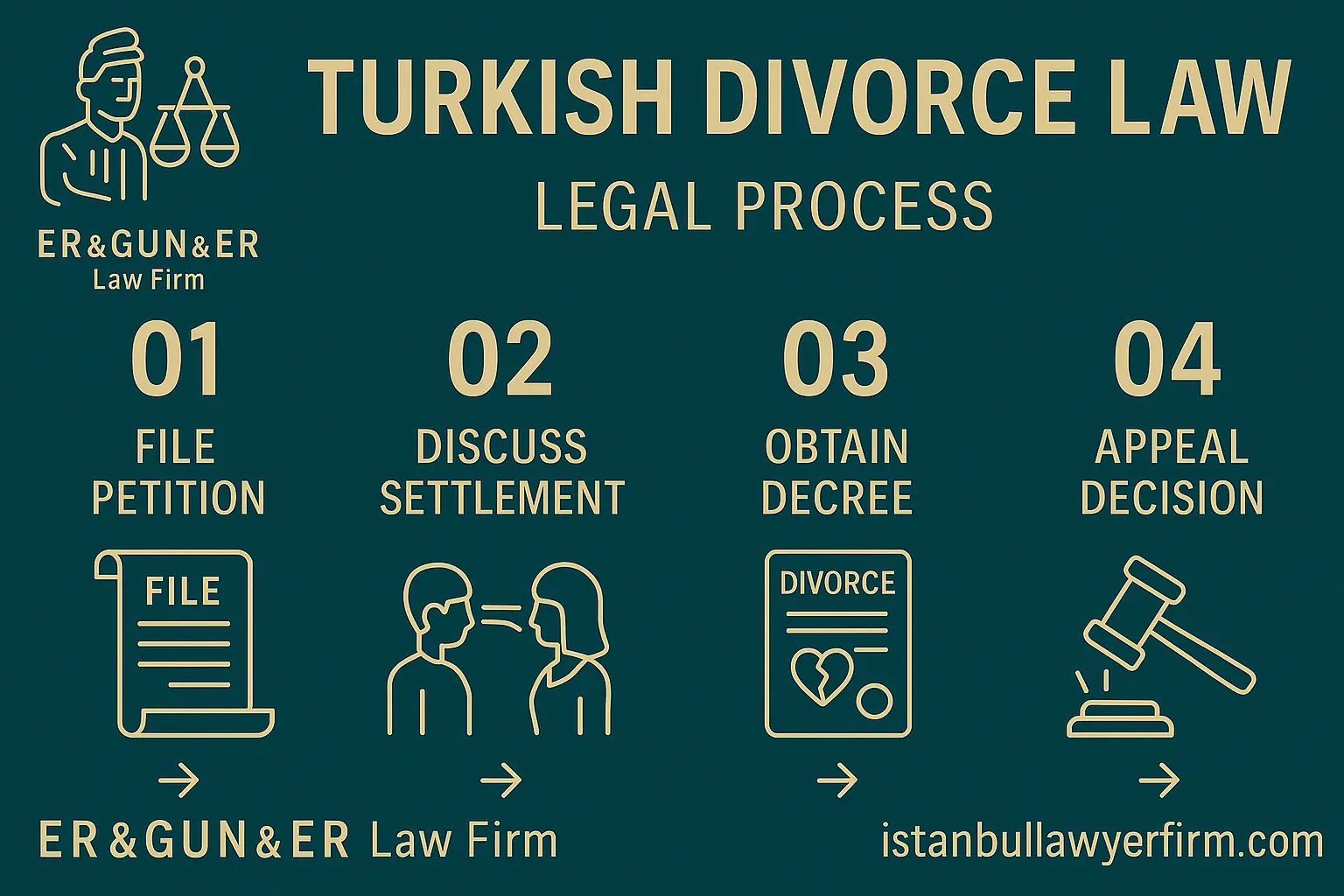
Divorce in Turkey—especially for foreign nationals, mixed-nationality couples, or expatriates—can involve a complex interplay of family law, international treaties, child protection laws, and civil procedure. Turkish family courts handle divorce petitions based on both fault-based and uncontested grounds, while also resolving issues like child custody, spousal support, and division of marital assets. At Istanbul Law Firm, our experienced English speaking lawyers in Turkey represent clients in all phases of divorce law proceedings, from initial filing to final decree and enforcement.
Whether you're facing a contested divorce, negotiating a marital agreement, or seeking recognition of a foreign judgment, we provide strategic legal representation tailored to your case. Recognized as a best lawyer firm in Turkey for family law, our team ensures your rights are protected and your future secured under Turkish law. Related: Overview of Turkish Family Law, How to File for Divorce as a Foreigner in Turkey
Grounds for Divorce Under Turkish Law
Turkish law recognizes both fault-based and no-fault (mutual consent) grounds for divorce. The legal framework is governed by the Turkish Civil Code, particularly Articles 161 to 184. Common fault-based grounds include adultery, severe insult, physical or psychological abuse, abandonment, and criminal conviction. These cases require the petitioner to prove fault and often involve witness testimony, medical reports, or documentary evidence. At Istanbul Law Firm, we guide clients through the legal standards required to substantiate such claims and file petitions that align with procedural law.
No-fault or uncontested divorces are based on mutual agreement between spouses who have been married for at least one year. In these cases, both parties must appear before the family court and submit a protocol that outlines their agreement on property division, custody, visitation, and financial support. Our English speaking lawyers in Turkey prepare this protocol with precision, ensuring it reflects client wishes while remaining enforceable. For expats, we also assist with court filings, sworn translations, and power of attorney arrangements if one spouse resides abroad.
As a best lawyer firm in Turkey for divorce law, Istanbul Law Firm helps clients select the most strategic legal grounds to avoid delays, reduce emotional stress, and secure favorable outcomes. We also defend clients wrongly accused in fault-based claims or facing retaliatory counter-petitions. Related: What Are Legal Grounds for Divorce in Turkey?, How Does an Uncontested Divorce Work?
Child Custody and Parenting Rights in Divorce Cases
Child custody is one of the most sensitive and critical issues in any divorce proceeding in Turkey. Under Turkish Civil Code Article 336, custody (velayet) is typically granted to one parent, while the non-custodial parent retains visitation rights unless restricted for the child's welfare. Courts prioritize the best interests of the child, considering age, emotional bonds, educational continuity, parental income, and living arrangements. At Istanbul Law Firm, we advocate for fair custody arrangements and submit detailed evidence to demonstrate parental capacity, stability, and child attachment patterns.
For expat families and dual-nationality marriages, custody cases can be further complicated by international relocation, differing legal standards, and the application of The Hague Convention on International Child Abduction. Our English speaking lawyers in Turkey represent both foreign and Turkish parents in cross-border custody disputes, emergency custody filings, and parental consent cases. We also negotiate joint custody protocols and structured visitation plans that accommodate schooling, holidays, and language barriers.
As a best lawyer firm in Turkey for child custody law, Istanbul Law Firm ensures that our client’s parental rights are protected without compromising the emotional well-being of the child. We also represent clients in custody modifications after divorce, especially where parental circumstances change or the child’s best interests are no longer being served. Related: How Turkish Courts Decide Custody Cases, Cross-Border Custody and Travel Disputes
Division of Property, Debts, and Marital Assets
In Turkey, the division of property following divorce is governed by the default legal regime known as "participation in acquired property" (edinilmiş mallara katılma rejimi), unless a prenuptial agreement stipulates otherwise. Under this model, all assets acquired during the marriage—including real estate, vehicles, savings, business shares, and pensions—are subject to equal division, while pre-marital property and personal inheritances generally remain with the original owner. At Istanbul Law Firm, we conduct a full legal audit of marital and personal property, tracing ownership, registration, and source of funds to determine what qualifies as divisible.
Disputes often arise over hidden income, undeclared assets, or loans taken during marriage. Our English speaking lawyers in Turkey initiate asset disclosure actions, request financial records, and file legal claims to ensure equitable division. We also defend against unjust enrichment claims and ensure that debt responsibility is fairly allocated between spouses, especially in cases involving business liabilities or mortgages tied to marital property. Our team also assists in asset freezing requests (ihtiyati tedbir) to prevent property transfers during divorce litigation.
As a best lawyer firm in Turkey for family asset law, Istanbul Law Firm combines legal precision with strategic negotiation. Whether through litigation or settlement, we secure fair outcomes for clients while preserving long-term financial security. Related: What Assets Are Divided in Turkish Divorce?, How to Protect or Claim Marital Property in Divorce
Alimony, Financial Support, and Spousal Maintenance
Alimony (nafaka) in Turkey is awarded to ensure financial balance between divorcing spouses, particularly when one party is economically disadvantaged or has custody of children. Turkish law recognizes three types of alimony: temporary alimony during proceedings (tedbir nafakası), permanent alimony post-divorce (yoksulluk nafakası), and child support (iştirak nafakası). The amount and duration of these payments depend on each spouse’s income, living standards, and the duration of the marriage. At Istanbul Law Firm, we represent both payers and recipients in determining fair, enforceable support orders based on documented need and ability to pay.
Courts may adjust alimony awards annually for inflation, or revise them altogether if the financial circumstances of either party change significantly. Our English speaking lawyers in Turkey assist clients in calculating accurate support figures, preparing income affidavits, and initiating or defending modification petitions. We also handle enforcement actions where alimony is unpaid, including garnishment orders or asset seizures. For clients residing abroad, we coordinate with international legal counsel to ensure enforceability of Turkish court judgments overseas under bilateral conventions.
As a best lawyer firm in Turkey for financial aspects of divorce, Istanbul Law Firm ensures that all support agreements are grounded in legal precedent, realistic to enforce, and adaptable to future needs. Related: How Alimony Works in Turkish Divorce Law, What to Do If Alimony Is Not Paid in Turkey
International Divorce, Foreign Judgments, and Cross-Border Recognition
Many expats, dual nationals, and Turkish citizens residing abroad initiate divorce proceedings outside Turkey. However, a foreign divorce judgment must be officially recognized by Turkish courts through a process known as exequatur (tanıma ve tenfiz) in order to have legal effect within Turkey. Without this recognition, issues such as marital status, property division, or name changes remain unresolved under Turkish law. At Istanbul Law Firm, we represent clients in filing recognition and enforcement petitions to have their foreign divorce rulings acknowledged by Turkish family courts.
The process involves submitting certified translations of the foreign judgment, proof of finality, and legal documents showing mutual notification or consent. If both spouses agree, the procedure can be expedited through a simplified notarized declaration. Our English speaking lawyers in Turkey prepare full application files, coordinate apostille authentication, and represent clients in court hearings or notarial proceedings to secure enforceability. We also help clients enforce foreign alimony or custody rulings within Turkey, and vice versa.
Recognized as a best lawyer firm in Turkey for international family law, Istanbul Law Firm ensures that your foreign divorce decree is fully valid in Turkey—protecting your status, rights, and property. Related: How to Register a Foreign Divorce in Turkey, Cross-Border Divorce and Child Support Enforcement
Why Istanbul Law Firm Is the Trusted Divorce Law Partner for Foreigners in Turkey
Divorce is a deeply personal yet profoundly legal matter—especially when it spans countries, cultures, and jurisdictions. At Istanbul Law Firm, we provide expert, sensitive, and results-oriented legal representation in Turkish family courts, with a special focus on the needs of expats, foreign nationals, and international couples. Whether your case involves contested custody, high-value assets, or the recognition of a foreign decree, our legal team delivers clarity, discretion, and strategic advantage in every phase of divorce proceedings.
Our English speaking lawyers in Turkey communicate fluently with clients, prepare bilingual legal documents, and ensure that every filing complies with Turkish civil procedure and international law. We also offer power of attorney representation for clients who are abroad and cannot attend hearings in person. From pre-filing consultation to final enforcement, we remain a steadfast partner, defending your rights and guiding you through every legal, emotional, and practical step.
As a best lawyer firm in Turkey for divorce and family law, Istanbul Law Firm is trusted by diplomats, international executives, NGO professionals, and global families for confidential, comprehensive, and cutting-edge legal counsel. Related: Why Language Access Matters in Turkish Divorce Law, How Turkish Family Law Affects Foreigners
Frequently Asked Questions (FAQ)
- Can a foreigner file for divorce in Turkey? – Yes. Foreign nationals can file for divorce in Turkish courts if either spouse resides in Turkey or holds Turkish citizenship. We handle cross-border filings and court representation.
- What are the grounds for divorce under Turkish law? – Grounds include adultery, abuse, abandonment, criminal conviction, or mutual consent after one year of marriage. We advise on fault-based and uncontested strategies.
- Is alimony mandatory after divorce? – Not always. It depends on financial disparity and fault. We help negotiate or litigate spousal support obligations based on the facts of each case.
- Can custody be shared in Turkey? – No. Turkish law grants custody to one parent after divorce. However, the non-custodial parent has visitation rights. We help structure fair parenting plans.
- How is property divided after divorce? – Only marital assets are split equally. Pre-marital property and inheritances generally remain with the original owner. We identify, document, and claim rightful shares.
- Can I get a divorce in Turkey if we were married abroad? – Yes. If your marriage is recognized in Turkey, you can file here. We handle jurisdiction and registration issues for international marriages.
- Do both spouses need to attend court in an uncontested divorce? – Yes. Both must appear once before the judge. Alternatively, power of attorney arrangements can be made for clients abroad.
- How long does divorce take in Turkey? – Uncontested cases may be resolved in weeks; contested cases often take several months or longer, especially with property or custody disputes.
- Will my foreign divorce be recognized in Turkey? – Only if it’s registered through a court recognition process. We handle tanıma and tenfiz proceedings to make foreign rulings valid in Turkey.
- Can divorce affect residence permits or citizenship status? – Yes, especially if residence was based on marriage. We offer post-divorce immigration consultation and legal planning.
- Can alimony or custody orders be changed later? – Yes. Turkish courts allow modification based on significant changes in income, health, or child needs. We initiate and defend such petitions.
- Who is the best legal team for foreign divorce cases in Turkey? – Istanbul Law Firm—a best lawyer firm in Turkey for divorce and family law—offering expert, discreet, bilingual legal support.
Contact Our Turkish Divorce Lawyers Today
Going through a divorce in a foreign country can be legally complex and emotionally overwhelming. Istanbul Law Firm provides expert, compassionate, and discreet legal support for expats, foreign spouses, and international couples facing divorce, custody, and property disputes in Turkey. Our English speaking lawyers in Turkey are ready to assist you with clarity and confidence. As a best lawyer firm in Turkey for divorce law, we protect your rights, secure your future, and represent you every step of the way. Contact us now to schedule a consultation.


